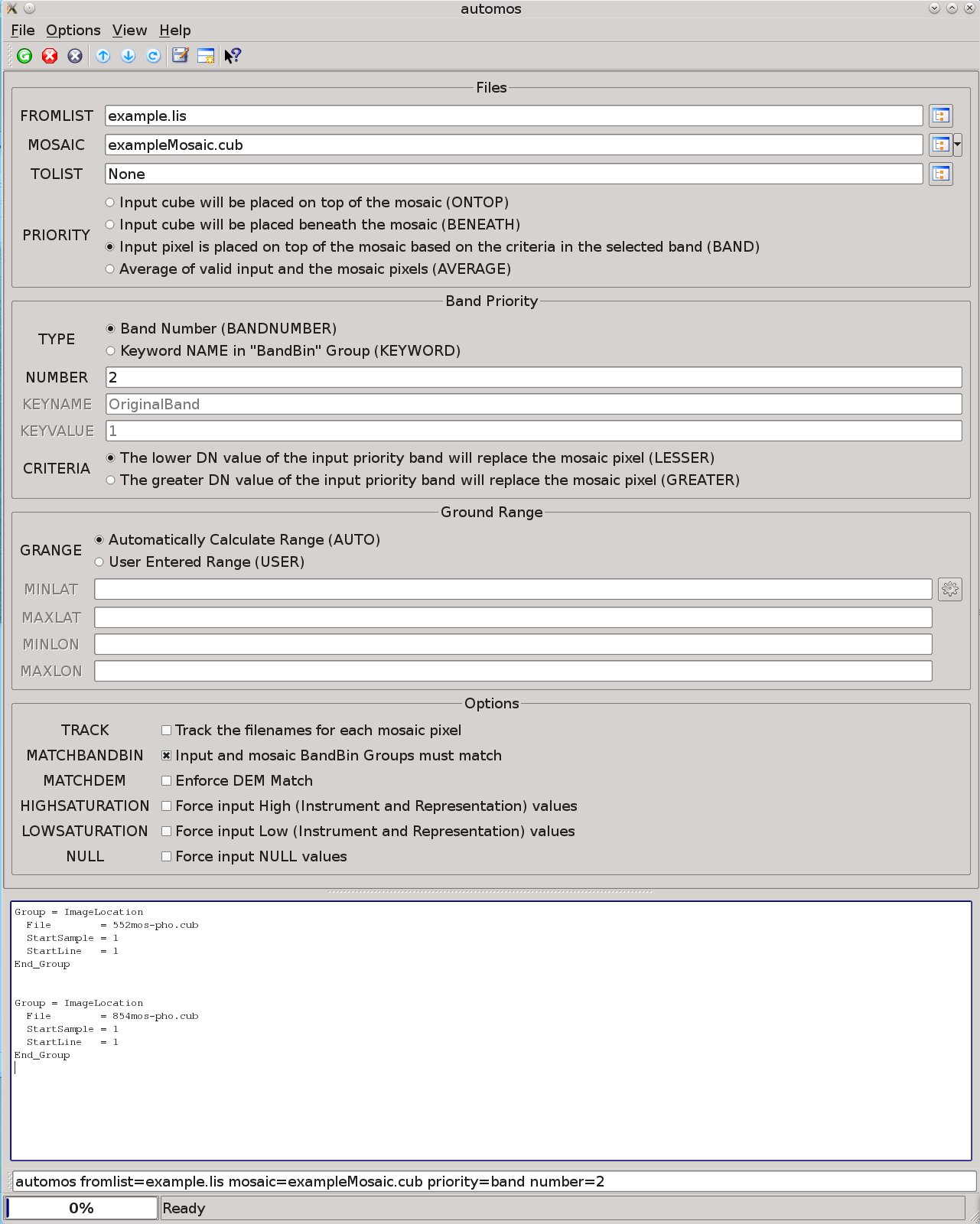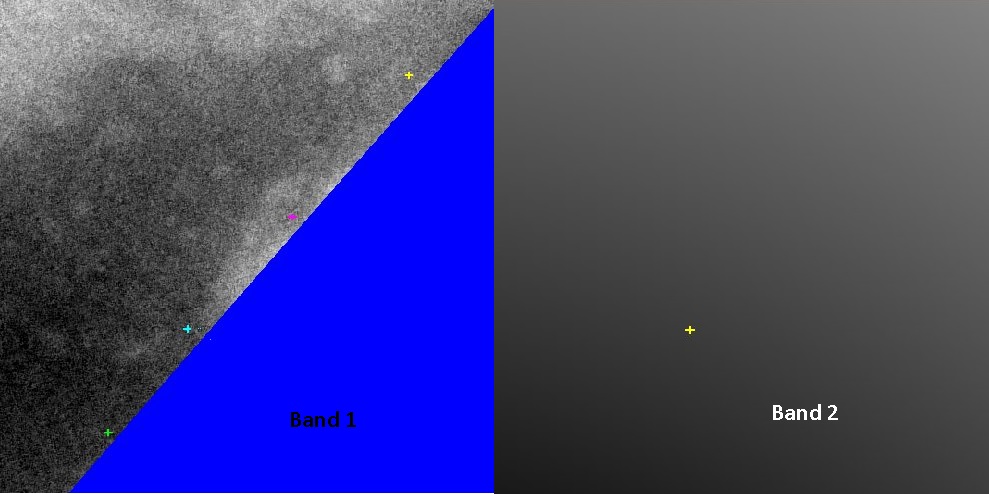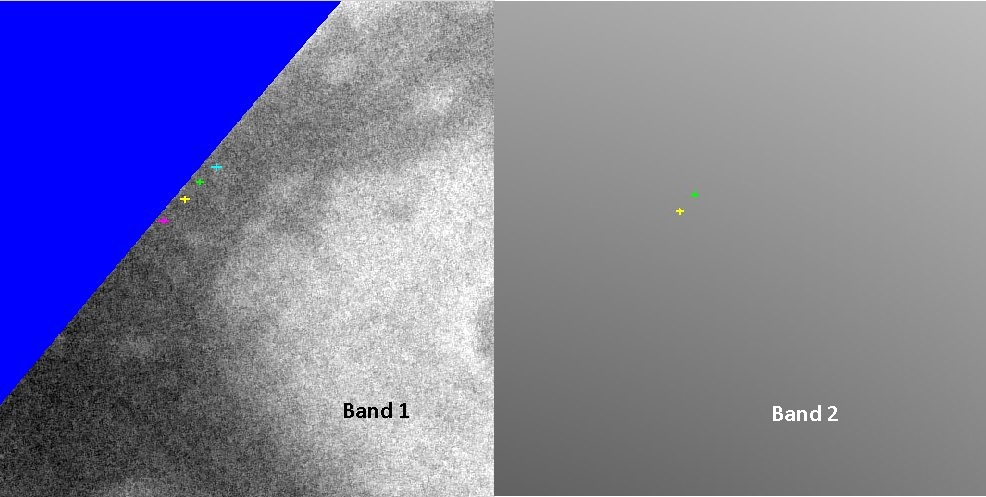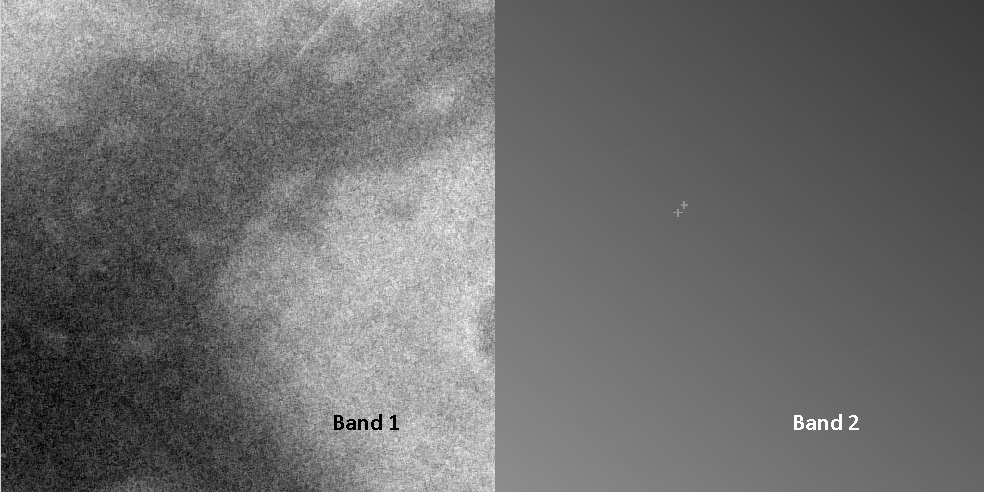automos
Create a mosaic using a list of map projected cubes
This application mosaics together ISIS cubes from a user-entered text file containing the input cube filenames (FROMLIST). If the output file (MOSAIC) does not already exist, the program will create it from the input cubes. Otherwise, the input cubes will be placed into the existing mosaic cube.
REQUIREMENT: The listed input cubes must be map projected (Level2). The input cubes are required to be projected to the EXACT SAME ProjectionName, PixelResolution (or MapScale), EquatorialRadius, PolarRadius, LatitudeType, LongitudeDirection, as well as specific map projection keywords (e.g., CenterLatitude, CenterLongitude). If these map projection requirements are not met, an error will be encountered.
Note: The latitude and longitude range of the individual input cubes may vary.By default, the input cubes are placed into the mosaic in the order in which they appear in the input list. Automos automatically determines the size of the new output mosaic by examining the latitude and longitude range of each input cube. The user may override this by entering their own latitude/longitude extents for the output mosaic cube by setting the GRANGE parameter.
Integrity-check Parameters:
MATCHBANDBIN = TRUE, the default is to require all the bandbin group and wavelength keywords of the input cube files exactly match the output mosaic.
MATCHDEM = FALSE, the default does not check the SHAPEMODEL keyword of the input cube files and does not propagate what DEM Shapemodel that was used when the input files were projected.
The PRIORITY parameter will determine how each input cube is combined with the current output mosaic cube. The process involves replacing an output mosaic pixel (or not) with an input pixel at the same location. There are many user options and criteria that influence the pixel replacement. Use of the PRIORITY parameter with and without other options is explained in the tables and descriptions below.
The TRACK feature creates a separate tracking cube in addition to the mosaic cube, and contains information for the source files of every pixel within the output mosaic. This cube will have the same base-name as the mosaic cube but will end in "_tracking.cub". The tracking cube must always reside in the same directory as the mosaic cube to be properly accessed; this means that if the mosaic cube is copied or moved, then its associated tracking cube must be copied or moved to the same location. The tracking cube will always be of type unsigned integer. Depending on the bit-type of the mosaic cube and/or the number of bands it contains, the tracking cube may be as much as four times the size of the mosaic cube itself.
The tracking cube can be used appropriately through the QVIEW-AdvancedTracking tool. As the user pans across the displayed mosaic, for every mosaic pixel location, QVIEW-AdvancedTracking will interactively report the index, the filename and the serial number of the input cube that was input to automos for that specific pixel location. Since the tracking cube is of bit-type unsigned integer, the DN values of 0, 1 and 2 are reserved for NULL, LRS and LIS, respectively, so valid pixel DN values will begin at an offset of 3. In other words, a pixel of DN value 3 in the tracking cube means that this same pixel within the mosaic was taken from the first input image. The tracking cube cannot be used outside of the QVIEW-AdvancedTracking tool except as a visual representation of the source cubes for the different pixels.
The TRACK feature works with Priority options ONTOP and BENEATH for single band input cubes. It works for multiband cubes for PRIORITY=ONTOP only when the NULL, HIGHSATURATION and LOWSATURATION options are set to true. It also works for multiband cubes when PRIORITY=BAND. Furthermore, this feature is NOT supported when PRIORITY=AVERAGE.
Please Note: Prior to ISIS version 3.6.0, tracking for the various mosaicking apllications was being handled with an internal tracking band. Tracking is now being handled by an external tracking cube that contains the associated tracking information. This application can no longer add to mosaics of the old format. In order to continue to use these older mosaics with the updated mosaicking applications, you must first use the trackextract utility application to extract the tracking band and the associated tracking information into an external tracking cube.
The following table describes how the program will determine the pixel value in the output mosaic for areas of image overlap.
| PRIORITY | RESULT |
|---|---|
| ONTOP |
This is the default. The current input image will be placed on top of the
output mosaic. Thus in any area of overlap, the Valid pixel values for the
current input image will appear in the output mosaic (it replaces the output mosaic
pixel). Invalid input Special Pixels
(NULL,HRS,HIS,LRS,LIS) will NOT
replace an existing Valid output mosaic pixel unless the optional flags are set. Refer
to parameters HIGHSATURATION,LOWSATURATION, and NULL to override replacement of Valid
output mosaic pixels.
NOTE: When using this priority with multi-band mosaics and with the TRACK option set, all Special Pixel flags must be set as well. This is because the same pixel within different bands of a single input image may hold both Valid and Special Pixel values, and since our Tracking capabilities can only track one input image per pixel (as it is a single band), it must accept the values for that particular pixel from every band in the input image being placed on top. |
| BENEATH | The current input image will be placed beneath the output mosaic. Thus in any area of overlap, the Valid pixel values for the current mosaic will remain in the output mosaic. The Valid pixel values for the current input image will only replace the NULL pixels values in the output mosaic. The HRS,HIS,LRS and LIS special pixel values in the output mosaic will NOT be replaced by the Valid input pixel. The parameters HIGHSATURATION, LOWSATURATION and NULL are not supported under this priority. |
| BAND | The input image pixels will be placed in the output mosaic based on the "Lesser" or "Greater" criteria of a priority band defined by the user. Parameters that apply to this priority feature are TYPE, NUMBER, KEYNAME, KEYVALUE, CRITERIA. |
| AVERAGE |
Overlapping Valid pixel values from the current input image and output mosaic will be
averaged for the new mosaic pixel values. A count-band is created with the output
mosaic file. The count-band keeps track of the number of images involved in the
averaging of the input DN values for each pixel in the mosaic. Invalid input pixel
values will not be included in the average. In the case where only one Valid pixel
exists between the input image pixels or the current mosaic pixel, the Valid pixel is
retained in the current output mosaic. Refer to parameters HIGHSATURATION,
LOWSATURATION, and NULL to override replacement of valid output mosaic pixels.
Choosing this priority will cause the mosaic to have twice the number of bands of the input image. Hence the file (byte) size of the mosaic is increased due to the count-bands. NOTE: If an existing mosaic does not already contain a count-band, an error will be encountered. |
Each of the following priority option tables indicates the resulting output pixel for a particular input pixel, given the selected special pixel options (parameters HIGHSATURATION for HRS, HIS; LOWSATURATION for LRS, LIS; and NULL) in each table row.
| PRIORITY=ONTOP | |||||
|---|---|---|---|---|---|
| Options | Images | ||||
| High Saturation | Low Saturation | Null | Input Pixel Value Type | Current Mosaic Pixel Value Type | Output Mosaic Pixel Value Source |
| False | False | False | Valid | Special or Valid | Input |
| False | False | False | Special | High Saturation or Low Saturation or Valid | Mosaic |
| False | False | False | Special or Valid | Null | Input |
| True or False | True or False | True | Valid | Special or Valid | Input |
| True or False | True or False | True | Special | Special or Valid | Input |
| PRIORITY=BENEATH | ||
|---|---|---|
| Input Pixel Value Type | Current Mosaic Pixel Value Type | Output Mosaic Pixel Value Source |
| Special or Valid | Null | Input |
| Special or Valid | High Saturation or Low Saturation or Valid | Mosaic |
| PRIORITY=BAND | |||||
|---|---|---|---|---|---|
| Options | Images | ||||
| High Saturation | Low Saturation | Null | Input Pixel Value Type | Current Mosaic Pixel Value Type | Output Mosaic Pixel Value Source |
| False | False | False | Valid | Valid | Criteria based |
| False | False | False | Valid | Special | Input |
| False | False | False | Special | High Saturation or Low Saturation or Valid | Mosaic |
| False | False | False | Special or Valid | Null | Input |
| True or False | True or False | True | Special | Special or Valid | Input |
| True or False | True or False | True | Valid | Valid | Criteria based |
| True or False | True or False | True | Valid | Special | Input |
| PRIORITY=AVERAGE | ||||||
|---|---|---|---|---|---|---|
| Options | Images | |||||
| High Saturation | Low Saturation | Null | Input Pixel Value Type | Current Mosaic Pixel Value Type | Output Mosaic Pixel Value Source | Count Band Pixel Value (# of images used for average) |
| False | False | False | Valid | Valid | Average | increment count by 1 |
| False | False | False | Valid | Special | Input | count = 1 |
| False | False | False | Special | Special | Mosaic | count = 0 |
| False | False | False | Special | Valid | Mosaic | count unchanged |
| True or False | True or False | True | Special | Special or Valid | Input | count = 0 |
| True or False | True or False | True | Valid | Valid | Average | increment count by 1 |
| True or False | True or False | True | Valid | Special | Input | count = 1 |
Categories
Related Objects and Documents
Applications
History
| Jim Mathews | 1992-01-01 | Original version |
| Jeff Anderson | 2004-02-26 | Converted to Isis 3.0 |
| Jeff Anderson | 2004-07-28 | Fixed bug caused by PVL refactor |
| Elizabeth Miller | 2005-11-15 | Added appTest, and fixed fromlist filter |
| Elizabeth Miller | 2006-05-18 | Depricated CubeProjection and ProjectionManager to ProjectionFactory |
| Elizabeth Miller | 2006-08-03 | Added user entered range and helper button |
| Elizabeth Miller | 2006-09-01 | Added the MATCHBANDBIN option that checks to make sure the input cube bandbin group matches the mosaic bandbin group. The default is true. |
| Sean Crosby | 2007-02-28 | Added an exception that reports which input cube is causing a problem while mosaicking. |
| Sean Crosby | 2007-03-06 | Program no longer throws an exception when an input cube does not fit into the output mosaic. Instead, any files that are not included in the output are listed in the application log. |
| Sean Crosby | 2007-03-20 | Corrected bug in determining if an image fits into the output mosaic |
| Sean Crosby | 2007-03-20 | Fixed one of the application tests |
| Stuart Sides | 2007-04-16 | Fixed bug where input cubes where incorrectly not processed. |
| Steven Lambright | 2008-05-13 | This program now utilizes ProcessMapMosaic |
| Sharmila Prasad | 2009-10-19 | Added option "TRACK" to track pixel origin. Also added new priority called BAND where specified input and mosaic band is compared for moving input to mosaic and to track the pixel origin. Added parameter "TYPE" to choose Band "NUMBER" or PVL "KEYWORD" from the BandBin group. If "BANDNUMBER" is chosen, then "NUMBER" is activated to enter band number. If "KEYWORD" is chosen then parameter "KEYNAME" and "KEYVALUE" are activated to enter key name and value from the BandBin group for band comparison. Band comparison "CRITERIA" are "LESSER" or "GREATER" than. Also there are options "HIGHSATURATION", "LOWSATURATION" and "NULL", set to true will cause HS, LS and NULL input pixels to be copied to the mosaic regardless of the priorities and criteria. These options are not supported for "BENEATH" priority. Track the origin for multiband ONTOP priority if all the Special Pixel flags are set. Store the Serial numbers of the input mosaic in the mosaic along with the file name. |
| Sharmila Prasad | 2011-01-19 | Added "AVERAGE" priority where the mosaic will be average of valid input and mosaic pixels. |
| Sharmila Prasad | 2011-01-24 | Option to match DEM and also added new group "mosaic" to hold ShapeModel attributes for the mosaic |
| Sharmila Prasad | 2011-09-07 | Fixed bug #0000390 - tracking should continue even if the first image does not map onto the mosaic |
| Sharmila Prasad | 2011-10-25 | Fixed bug #0000464 - add optional list TOLIST containing all the files names that were added onto the mosaic. |
| Sharmila Prasad | 2011-11-07 | Updated documentation for Average priority. Fixes #553 |
| Steven Lambright and Stuart Sides | 2012-07-16 | Fixed a border condition that caused only a few samples of an input image to be put into an output mosaic. The trigger for this condition was an input image that spanned more than the 0-360 domain by just a sample or two on the 0 side (started at -0.000?? degrees longitude instead of zero). Other cases of spanning more than the world - or just crossing the seam - could have exhibited problems. Fixes #967. |
| Kimberly Oyama | 2012-09-18 | When an image is placed twice (usually because the longitude range is greater than 360 and encompasses the image more than once) only the last occurance was written to the log file. This has been fixed so that there is an entry in the log file for every image placement. Also modified mapmos and handmos to do the same. Fixes #976. |
| Debbie A. Cook | 2012-12-10 | Changed to use TProjection instead of Projection. References #775 |
| Debbie A. Cook | 2013-04-03 | Fixed type in specification of TYPE default in Band Priority group discovered when creating ringsautomos. It was fixed here to make the applications consistent. References #775 |
| Jeannie Backer, Tammy Becker, and Kimberly Oyama | 2014-04-07 | Updated user documentation. Fixes #1617. Fixes #1620. References #1623. References #1550. |
| Cole Neubauer | 2017-11-20 | Added parameter checking to XML MAXLON and MAXLAT to check if they are greater than their minimum counterpart. Fixes #5148 |
| Summer Stapleton | 2018-08-13 | Updated documentation to reflect new handling of tracking capabilities with an external tracking cube as well as clarify why special pixel flags are required when priority=ontop for multiband mosaics. References #2092 |






